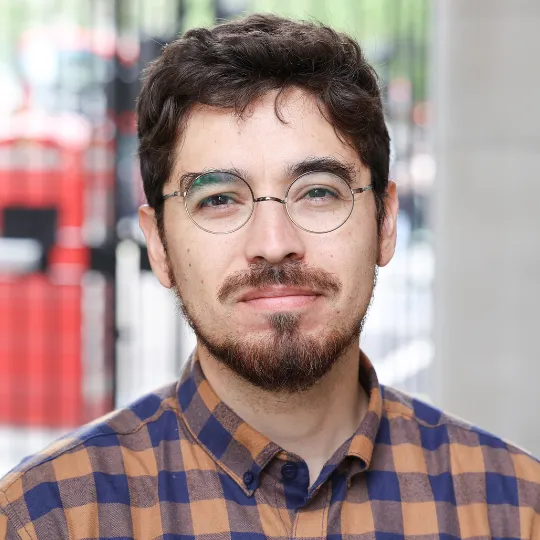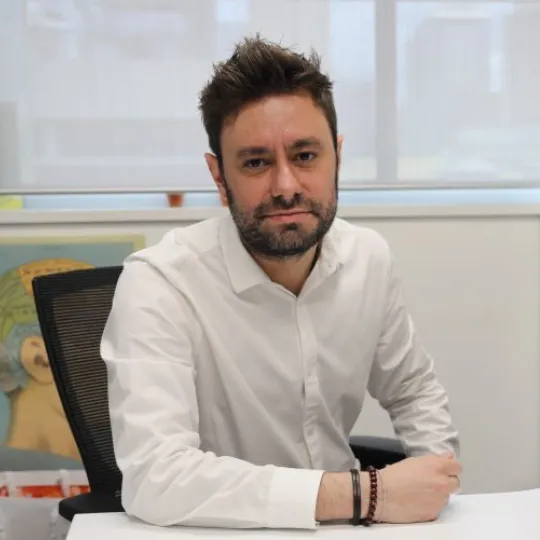‘I'm delighted to welcome our new cohort of Fellows. Their collective work showcases an inspiring range of initiatives that interrogate our relationship with technology. They will benefit from the support and expertise within the Institute, and we will benefit from their expertise. I'm looking forward to seeing their work progress.’
Professor Marion Thain, Chair-Director of the Digital Futures Institute
04 June 2024
Digital Futures Institute announces four Institute Fellowship projects for 2024-25
Four interdisciplinary projects awarded Institute Fellowships from the Digital Futures Institute for the 2024-25 cohort, each of which is led by a pair of colleagues who bring together SHAPE and STEM expertise.

Eight projects have been funded by the Digital Futures Institute with a Principal Investigator (PI) and Co-Investigator (Co-I) attached to each project.
Professor Btihaj Ajana (PI) & Dr Tasmina Islam (Co-I) , Dr Daniel Chávez Heras (PI) & Professor Zoran Cvetkovic (Co-I), Dr Jonathan Gray (PI) & Professor Elena Simperl (Co-I), and Dr Dan Nicolau (PI) join the Institute for six-months to develop research and education projects that enhance our understanding of our relationship with technology.
The announcement of the Fellows is the second cohort since the inception of the Institute in 2023.
The Fellows will all start work in the 2024-25 academic year and focus on specific areas of their research.

Professor Btihaj Ajana & Dr Tasmina Islam
Professor Btihaj Ajana’s project “Biometric Futures” explores the use of biometrics in everyday life. Building on her earlier work on biometric governance and self-tracking, the project investigates the rise in personal and governmental use of biometrics and some of the pressing ethical and socio-political issues associated with it. The project is developed in collaboration with Dr Tasmina Islam, Senior Lecturer in Cybersecurity Education.
I am delighted to receive The Digital Future Institute Fellowship. It is an excellent opportunity to develop a grant proposal on the important and socially significant topic of biometrics. Through the support and resources provided as part of the fellowship, I will benefit from peer feedback and the various opportunities for networking and collaborations, all of which will help me refine and strengthen my project proposal.
Professor Btihaj Ajana
Professor Btihaj Ajana is a Professor of Ethics and Digital Culture in the Department of Digital Humanities. She is an international scholar and media practitioner in the fields of digital culture and social analysis. Her interdisciplinary academic research focuses on the intersections between technology, biopolitics and ethics, particularly developments in surveillance technologies and biometric identity systems, digital health and self-tracking culture, and border management technologies.

Dr Daniel Chávez Heras & Professor Zoran Cvetkovic
Dr Daniel Chávez Heras’ project “Engines of Attention: Advanced Computational Modelling of Cinematic Time” focuses on machine vision and attention. Developed in collaboration with King’s Digital Lab and Professor Zoran Cvetkovic from the Faculty of Natural, Mathematical & Engineering Sciences, the project builds on Daniel’s recent work on Cinema and Machine Vision to investigate key debates in the history and theory of film through scientific and creative computing, including methods and tools in the fields of signal processing, multi-modal machine learning, and generative AI.
As an early career researcher, having the time and mentorship to focus on developing a larger project is immensely valuable. I am very excited and look forward to starting this Fellowship.
Dr Daniel Chávez Heras
Dr Daniel Chávez Heras is a Lecturer in Digital Culture and Creative Computing in the Department of Digital Humanities. He specialises in the computational production and analysis of visual culture. His research combines critical frameworks in the history and theories of cinema, television, and photography, with advanced technical practice in creative and scientific computing, including applied machine learning technologies and artificial intelligence.

Dr Jonathan Gray & Professor Elena Simperl
Dr Jonathan Gray’s project “Environmental intelligences” in collaboration with Professor Elena Simperl from the Department of Informatics explores how STEM and SHAPE approaches can be combined to critically engage with the histories, politics and possibilities of environmental AI and data practices. It looks into the roles of data and machine learning in knowing and changing environments and investigates how inventive interdisciplinary methods might inspire more equitable and inclusive socio-ecological futures.
This Fellowship will support the development of a new interdisciplinary initiative on “environmental intelligences” exploring how AI and associated datasets are used to understand and respond to environmental issues. It will enable us to review the current state of the art and to bring depth to our plans.
Dr Jonathan Gray
Dr Jonathan Gray is a Senior Lecturer in Critical Infrastructure Studies in the Department of Digital Humanities. His work explores the role of digital data, digital methods and digital infrastructures in the composition of collective life.

Dr Dan Nicolau
Dr Dan Nicolau’s project “Is the Protection of Attention a Human Right?” explores the impact of social media on attention. The project tests the hypothesis that social media use can cause inflammation, potentially by interfering with attention. In collaboration with the Digital Future Institute’s Centre for Data Futures, Dr Dan Nicolau also explores the potential policy and legislative implications of such a link.
Attention is extremely important to a healthy lived experience, and it's a highly limited resource – that's why we talk about it like we do about money. But social media platforms "take" it from us without really asking. The Fellowship provides us with an opportunity to explore the repercussions of this, including in terms of potential effects on the immune system and possible legislative implications.
Dr Dan Nicolau
Dr Dan Nicolau is a mathematician, engineer and physician based in the Peter Gorer Department of Immunobiology (Faculty of Life Sciences and Medicine). His research focuses on using mathematics and computer science methods to better understand complex biological systems, particularly as they relate to disease states, inflammation and ageing.




